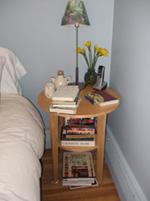TW Interview by Judith A. Ross
The Former Head of House & Garden Publishes Her Own Blog
Dominique Browning doesn’t know it (yet), but she inspired this sleek, roomy night table my husband built for me a few years ago.
 The inspiration came from her 2002 book Around the House and in the Garden, where she described her post-divorce efforts to make her bedroom luxurious:
The inspiration came from her 2002 book Around the House and in the Garden, where she described her post-divorce efforts to make her bedroom luxurious:
“The tiny hotel-fare side tables were gone. This time I moved in a big table and began to think of it as command centraI…. I made room for a dish as a resting place for a bottle of wine (or sparkling water or whiskey, or even hot milk), an old crystal goblet (why save the good stuff for dinner parties?), a sturdy lamp, a few rocks from my favorite beach….”
I’m not the only one whose domestic environs are a bit more comfy due to Browning’s influence. As top editor, she ran the magazine House & Garden for more than a decade. She’s also worked and written for the New York Times, Wall Street Journal, New York, O, Food & Wine, Travel & Leisure, and Wired, among other publications. She now writes a monthly column about environmental issues for the Environmental Defense Fund website.
The most recent chapter of her life began in November 2007, when Condé Nast suddenly shut down House & Garden. Browning’s 2010 book Slow Love documents the months following her layoff from the magazine she’d poured so much into—or as the subtitle puts it, “How I Lost My Job, Put on My Pajamas, and Found Happiness.”
During our interview this March, Browning told me she doesn’t advocate slow living. On the contrary: “People want busy, productive lives. What I’m making a plea for is carving out moments in which to reconnect with the world.”
 Enter self-publishing, in the form of her blog Slow Love Life. Browning began it a year ago and says:
Enter self-publishing, in the form of her blog Slow Love Life. Browning began it a year ago and says:
Blogging for me is a wonderful way of slowing down and being meditative. I know that’s going to sound weird, but when I have a moment, say, of admiring a grasshopper and then sit down and write about that, it’s very calming and takes me out of myself.”
TW: When you think about self-publishing, what does that mean to you?
DB: What it means to me is unmediated publishing. I have been an editor my entire life, and I love skipping the editor! [Laughter] You are the boss of your own writing. It has really made me think about the sins I have visited on writers in my day.
Sure, there are plenty of times when I look back at something I wrote and have the distance to go through and edit it myself. I certainly don’t think editors are useless creatures by a long shot. If anything, editors are going to become more important in the next decade, because there is such a flood of stuff coming out.
But editors are not only cleanup crew; they are gatekeepers. Now I think it’s terrific to have those gates wide open, and I marvel at the writing talent out there that was once hidden from our eyes.
TW: Your blog enabled you to share your experiences during a recent trip to India with the public in a very personal way. How did that feel?
DB: That is the first time I had done something like that, and I loved it. I was trying to find a way of doing travel writing that wasn’t just “well, then I checked into this hotel, and then we saw this thing….” Of course, you can find any of that in travel guides.
I wanted to share and filter my own responses to what I was seeing. It forced me to go much deeper. I’ve looked back at my iPhoto queue, and there were hundreds of photographs of beautiful things. But I found myself not gearing my writing to “oh my God, this beautiful thing.” I really pushed myself to show things that were connected to something more meditative or analytical.
That’s what I was there for—to think about the slow love angle on traveling. What’s catching your eye, what’s slowing you down, what’s forcing you to think a little deeper about the quality of life around you?
TW: Would you have shared those experiences without the blog? What would have been different?
DB: For me, the blog is a radical experience of opening up. The only writing I had done before I lost House & Garden was my column once a month. I probably would have gone back to work, written a 700-word column that somehow touched on some of what I was thinking, and sent that into the world five months after my trip was over.
I never owned a camera until I started this blog. I had never taken a picture of my children. Thank God my sister had a camera. I was intimidated by the entire thing. So just for starters, having the blog put a camera in my hands, because somebody told me you can’t do a blog without photographs.
I am totally in love with taking pictures now. It has become a wonderful way as a writer to think about what I am seeing and to share the visual experience. It’s incredible to me. And it’s not as in a story assignment where I have to ask people—all those things that happen at a magazine. One person wants it this way; another person wants it that way. The writer is sitting there waiting. To be free of that is great.
TW: What is it like to have people comment on your posts?
DB: I love the comments. The way I think of it now is that I don’t have editorial meetings anymore, and I don’t have colleagues in the office. So I think of my blog commenters as my colleagues. They often bring up new ideas and point me in new directions.
I post about twice a week, sometimes more often. I have no idea how large my audience is, because I made a deal with myself that I would not pay any attention to this. I can say that my readers are extremely active and engaged. I get fifty or sixty comments on some posts, and they come from all over the world, with readers checking in from France, England, Italy, Japan, Australia, and Kenya.
David Terry [one of Browning’s regular commenters] is himself an art form. His comments are so wonderful and entertaining, they are like their own mini-blogs.
I love it that people feel free to do that, or just send one word, or anything in between.
TW: Were you surprised that people relate to you so strongly?
DB: It was a surprise. Most of my magazine career was pre-email and certainly pre-blog, and Condé Nast was so slow to get on that. I missed most of it. So I didn’t have a lot of professional experience with that kind of response.
We used to get tons of mail about my column, but again, it would be written three or four months before the magazine came out. It felt disassociated somehow.
Now I love the immediacy of the response. I love the feeling of having a conversation. And I love it when people in the commentary start talking to each other.
Philosophically, some very interesting things come up. I notice a lot of anxiety about “how sad can we get?” Is the blog supposed to take people away from a tragedy like the Japanese earthquake and tsunami, or are we able to reflect on those events in a meaningful way?
TW: I noticed that after posting about the disaster in Japan, you followed up a day later with a lighter post about yoga. Were you intentionally trying to give us a break from a story that weighs so heavily on us?
DB: I was just thinking about that this morning. I happen to be obsessed with the Japan story. I think a Freudian would say it’s because some of our worst nightmares are being played out. As an environmentalist, I’ve been thinking a lot about nuclear energy, and now here we are—at exactly the tragedy that people worry about.
In retrospect, I wish I’d waited one more day to post the yoga piece. But what happened was that I got home, I wrote about it, and it was so fresh on my mind that I hit “post” immediately.
I think we all have to do that. Otherwise, we’d become paralyzed with depression, right? For me, the trick is to stay aware and engaged, to be a good citizen of the world yet remain a balanced, sane, and healthy person.
TW: Even as a writer of online content, I often find reading pieces online difficult. Maybe it’s because one can’t put an online piece aside to finish later in the same way one can a book or magazine. What do you think?
DB: Bloggers could use more tricks from the magazine business. The reason we have subheads, breaks, initial caps, and things like that is because many people have the same problem reading long pieces in print. All that stuff developed as a way for editors to help readers move along through a long text.
When I started blogging, everybody said, “ You’ve gotta blog every day and you can’t write things that are too long.” I find that I don’t have to blog every day—people will stay with pieces. But I’ve never published more than 1,200 or 1,500 words. When I look at New Yorker articles that are 10,000 words, I often have to print them out.
TW: When I asked you about the future of publishing at one of your readings, you said you were more optimistic than you had been in years. Can you explain why?
DB: If you think about publishing as just communicating information from a person to a reader—as opposed to thinking about print on a piece of paper—we now have so many more ways to reach readers. And we’ve only begun to tap into the possibilities, not only visually but intellectually. It’s an incredibly exciting time.
It’s what we were talking about before: the level of talent that used to be lost out there because people were too shy or didn’t know the right people. Since the gatekeeper thing has dropped away, voices are coming through that wouldn’t have come through before.
In the meantime, though, places like the New York Times are going to figure out the income stream. Contrary to what everybody is saying, they are becoming more powerful, not less. They are becoming not only a newspaper but a television station and an incredibly sophisticated graphic content provider.
Take the Japanese earthquake situation with the nuclear reactor. In one graphic, you scroll the bar and can see before and after. The other is a series of graphics about how a nuclear reactor works. These are unbelievably sophisticated, and any magazine or newspaper editor would give his or her eyeteeth to have done something like that. [For an example from this past March, see the NYT’s interactive feature “Hazards of Storing Spent Fuel.”]
I wish I were somewhere where they’d fund me to do lots of experimentation with iPads!
TW: Why?
DB: A sidebar in a magazine does two things: It amplifies the information or it’s a way to draw a reader in. So with an iPad—oh my God!—the things you can do to seduce a reader and to add to the reading experience. And the playfulness! The way you can play with photography and film, and make that flower bloom right in front of your eyes.
TW: Any advice for those of us trying to keep up with this new and ever-changing publishing environment?
DB: We undervalue the marketing aspect of our blogs. I’m not selling ads, I’m not making money from it, yet I know people read it, and I know things have happened because of it. And you never know what that’s going to be or how that’s going to work.
But in general, my advice is the same it’s been since I was hiring writers and assigning stories: Just keep writing! An online outlet is terrific for that. If ten people read your blog and give you commentary, that’s fantastic.
Writing does involve discipline and exercise. The more you write, the better you are, the more fluent. It’s like playing the piano. So don’t give up hope. Figure out another way to pay the bills.
A Dominique Browning Sampler
Selected Books:
- Slow Love: How I Lost my Job, Put on My Pajamas, and Found Happiness (Atlas & Co. 2010).
- Paths of Desire: The Passion of a Suburban Gardener (Scribner, 2004).
- The Well-Lived Life: One Hundred Years of House & Garden (Assouline Publishing, 2003).
- Around the House and in the Garden: A Memoir of Heartbreak, Healing, and Home Improvement (Scribner, 2002).
Images and Blog Posts Cited:
- “Laundry on Sunday,” February 22, 2011
- “Winter Water,” March 6, 2011
- “Spinning Out” [on Japan], March 13, 2011
- “Yoga Teachers: A Few Humble Requests,” March 14, 2011
- “Fiddleheads,” April 10, 2011
One of the things I love best about my new blogging life is that I often feel I am eavesdropping on a great dinner party—having planted a conversational seed and walked away, to mix food and garden metaphors. I'm listening to witty, provocative, serious, intelligent, lively, and generous people commenting on anything and everything. But I get to stay in my pajamas. We all do!
— “Food for Thought” by Dominique Browning



